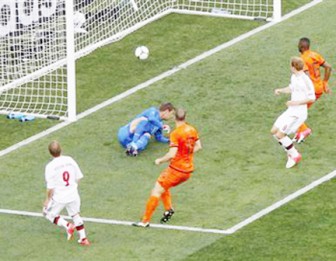GDANSK, Poland, (Reuters) – Denmark provided the first upset of Euro 2012 when they beat Netherlands 1-0 in Kharkiv yesterday in the opening game of Group B to leave the Dutch in a perilous position.
With Germany and Portugal, who meet later in Lviv, completing what is regarded as the toughest group at the finals, Netherlands have little margin for error after Michael Krohn-Delhi’s goal earned the Danes victory.
Dutch 18-year-old Jetro Willems became the youngest player ever to take the field at a European Championship but it was to be a losing debut as Denmark sealed a first win in open play over Netherlands since 1967.
It will revive memories of their unlikely triumph at the finals in 1992 when they arrived as rank outsiders but went on to lift the trophy in Sweden.
It also serves as a warning to the rest of the so-called favourites and backs up Italy goalkeeper Gianluigi Buffon’s claim that the “best don’t always” win as he prepared for his side’s opening match against holders Spain on Sunday.

The second day of the tournament switched across the border from Poland to co-hosts Ukraine and, while there was again much to admire on the field of play, there were slight concerns off it with the first reports of crowd trouble.
Security organisers confirmed that four stewards had needed hospital treatment after being attacked by Russian fans in the stadium after the Russia-Czech Republic match on Friday.
“Such things can occur over the next 22 days. If it gets hot, drinks will be consumed and such things can happen. It’s a normal situation,” said Marcin Herra, head of the Polish company in charge of coordinating the finals told local television.
DUTCH NIGHTMARE
There was dismay for Greece central defender Avraam Papadopoulos who will miss the rest of the tournament after suffering a knee injury in their 1-1 draw in the tournament’s opening game against Poland in Warsaw on Friday.
While most of the stadiums at the championship are sleek, modern edifices, Kharkiv’s Metalist is something of an oddity, with the blue metal supports that circle the ground making it appear like an enormous multi-legged insect.
It will host all three Dutch group matches but their opener was the stuff of nightmares.
Netherlands, winners of 23 of their previous 25 competitive matches, had their orange-clad legions of fans providing a familiar reassuring backdrop in the industrial city that once supplied the Soviet military but they lacked firepower as Denmark protected their early lead.
Krohn-Dehli needed no second invitation to surge into the Dutch area and blast a shot through the legs of keeper Maarten Stekelenburg after 24 minutes and, try as they might, the World Cup runners-up could find a telling reply.
The closest they came was Arjen Robben’s shot which hit the woodwork before the break.
Netherlands return to the stadium next Wednesday to take on Germany when defeat could leave their hopes of progressing to the quarter-finals in tatters.
“Now it is clear we have to beat Germany,” said Netherlands coach Bert van Marwijk. “We showed that we can play good football and create chances, while we proved in the past that we can beat Germany.”
HUMAN RIGHTS
Despite Ukraine joining the party, the controversy over its human rights record refused to go away.
Officials of Denmark and Netherlands met victims of alleged police torture in Kharkiv where opposition leader Yulia Tymoshenko is jailed.
Sports ministers held three hours of talks on police brutality, homophobia and the need for an independent judiciary in the eastern city before the Group B match.
Ukraine is hoping that hosting the finals will boost its chances of joining the 27-state European Union.
Government officials are already reeling from bad publicity over Tymoshenko’s case and allegations of racism in the build-up to the tournament, the biggest sporting event in eastern Europe since the collapse of communism.




